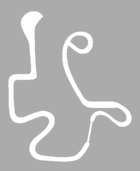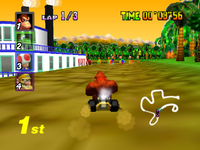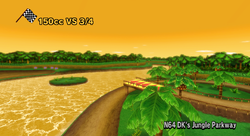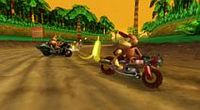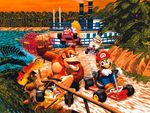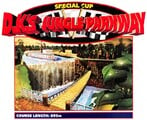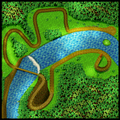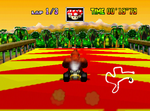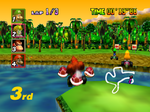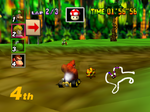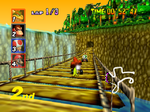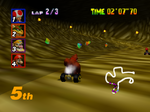N64 DK's Jungle Parkway
| DK's Jungle Parkway | |||||||||||
|---|---|---|---|---|---|---|---|---|---|---|---|

| |||||||||||
| Information | |||||||||||
| Appears in | Mario Kart 64 (1996) Mario Kart Wii (2008) | ||||||||||
| Cup(s) | Special Cup (64) Leaf Cup (Wii) | ||||||||||
| Based on | Jungle Hijinxs (Donkey Kong Country) | ||||||||||
| Distance | 893 m | ||||||||||
| Online play | No longer available (Wii) | ||||||||||
| |||||||||||
| |||||||||||
| |||||||||||
DK's Jungle Parkway (originally written as D.K.'s Jungle Parkway), also known as Donkey Jungle Park[1][2] or Donkey Kong Jungle,[3] is the first course of the Special Cup in Mario Kart 64 and is Donkey Kong's home track of the game. It reappears as a classic course in Mario Kart Wii as the third course of the Leaf Cup. The music for this course is the shortest of all Mario Kart courses in the series, with each loop being only about 15 seconds long.
Mario Kart 64[edit]
Course layout[edit]
The course begins on a dirt road with grass on both sides of the track; if racers go into the grass at any point along the course, unseen "restless natives," as the instruction booklet calls them, throw coconuts (which may actually be horned melons) at them. There is first a right turn followed by another, far more gradual right turn. Along the gradual turn there is a large river to the left of the track, which has a large paddle steamer with "Mario" written on it cruising around. Here racers also encounter the first set of Item Boxes. They then continue to turn right as they make a 270° loop up to a ramp with a large Dash Zone. As racers go off the ramp they cross the river. When racers land, they take a sharp left turn; the turn can be cut off if racers aim to the left while going off the prior ramp, so long as they do not fall into the river. After the left turn there is a brief straight along the river with another item set, followed by a right turn and another left turn. There is then another brief straight followed by another left turn, another item set, and a U-turn to the right. Racers then take a gradual U-turn to the left and encounter another item set followed by a very narrow wooden bridge; the bridge takes them over the river from before but has ropes on both sides that prevent racers from falling off. After the bridge, racers enter a cave where there is a right turn followed by a left U-turn. There is then the cave exit immediately followed by the finish line.
Shortcuts[edit]
There is a notable shortcut at the end of the track. By driving through the off-road in the cave, the player can cut off the final turn. Additional Item Boxes can also be found in this off-road.
Glitches[edit]
The original version has a glitch where it is possible to jump through the corner in the cave, resulting in as little as a 20-second race if done three times. This was not fixed in the Virtual Console release of Mario Kart 64.
Mario Kart Wii[edit]
DK's Jungle Parkway makes its classic course debut in Mario Kart Wii as the third race of the Leaf Cup. In that version, the Hammer Bros., Toads, Goombas, and Shy Guys ride the paddle steamer (only in single-player mode), the water is yellowish-orange instead of blue (to reflect the color of the sunset sky), and the jungle has been pushed back, with the coconuts that usually hit the player being removed. Another change is that inside the cave is mud, which slows down racers that try to cross it, unless they use a Mushroom, Golden Mushroom, Star, or Mega Mushroom to cut ahead without slowing down. The Dash Panel at the jump has been modified. In the original N64 version, if the player is shrunk by Lightning when approaching the jump, it is possible for the player not to make it over the river. In this version, the Dash Panel acts similarly to the Barrel Cannon, where the player always makes it across, even when shrunk, and also forces the drivers to go straight and prevents them from cutting ahead and/or going anywhere else. Also, the Arrow Signs are now brown with blue arrows instead of cream with red arrows. The course map has been rotated 90° counterclockwise.
This is one of two tracks in Mario Kart Wii, the other being SNES Mario Circuit 3, where it is impossible to do a trick since there are no trick ramps.
Tournaments[edit]
August 2008's first tournament required players to complete a GP race on DK's Jungle Parkway against Donkey Kong and Diddy Kong, who ride on the Phantom and Sneakster respectively. Both opponents have access to infinite Bananas, but players can still make use of Item Boxes; the second and third sets will always contain Green Shells, and the first and last sets will always contain Triple Green Shells. This tournament was later repeated as the second tournament of December 2009.
Profiles[edit]
Mario Kart 64[edit]
- Instruction booklet description:
- English:
The home of Donkey Kong, the Jungle Parkway was developed as a tourist facility and equipped with a racing ground for Karts. Carved out of the jungle, the road is mostly narrow. Be careful—should you leave the course, the restless natives will "voice" their complaints by throwing stones at you.
- English:
- Website description:
- English:
Donkey Kong's riverside course is a wild Kart safari!
- English:
Mario Kart Wii[edit]
- Website description:
- English (British):
A paddle steamer slowly meanders its way round the muddy waters as you shift into a much higher gear and tear around dirt tracks, over shaky wooden bridges and through a gloomy cave illuminated by flame torches.
- English (British):
Gallery[edit]
Mario Kart 64[edit]
The Dash Panel
Mario Kart Wii[edit]
Media[edit]
| File info 0:30 |
| File info 3:03 |
Additional names[edit]
Internal names[edit]
| Game | File | Name | Meaning
|
|---|---|---|---|
| Mario Kart Wii | old_donkey_64 | Old Donkey 64 |
Names in other languages[edit]
| Language | Name | Meaning | Notes |
|---|---|---|---|
| Japanese | ドンキージャングルパーク[?] Donkī Janguru Pāku |
Donkey Jungle Park | Mario Kart 64 |
| DKジャングルパーク[?] DK Janguru Pāku |
DK Jungle Park | Mario Kart Wii | |
| Chinese | 森喜刚丛林公园[?] Sēnxǐ Gāng Cónglín Gōngyuán |
Donkey Kong Jungle Park | |
| French (NOA) | Jungle de DK[?] | DK's Jungle | |
| French (NOE) | Jungle DK[?] | DK Jungle | |
| German | DKs Dschungelpark[?] | DK's Jungle Park | |
| Italian | Viale Giungla DK[?] | DK Jungle Parkway | |
| Korean | DK 정글 파크[?] DK Jeonggeul Pakeu |
DK Jungle Park | |
| Spanish (NOA) | Jungla de DK[?] | DK's Jungle | |
| Spanish (NOE) | Pista de la Jungla DK[?] | DK Jungle Track |
Trivia[edit]
- When played on the Nintendo 64, this course has a noticeable drop in framerate caused by the boat and waterfall. To counteract this, a code is enabled when split screen is in play which changes the amount of in-game time elapsed per input frame to prevent gameplay from moving much slower.[4]
- This results in an unintended side effect when played on certain emulators (including the Wii Virtual Console and IQue releases), as the lag is not present due to improved hardware but the frame scaling code is still enabled, causing the game to run faster than normal when played in split screen mode. The Wii U Virtual Console release corrected this by removing the frame scaling code.
- In Mario Kart Wii, if the player uses the rearview mirror to look back, the torches inside the cave can be seen lighting up again.
References[edit]
- ^ December 1996. Nintendo Magazine System (UK) issue 51. Page 28.
- ^ April 1997. Nintendo Magazine System (Australia) issue 49. Page 41.
- ^ December 1996. Nintendo Magazine System (UK) issue 51. Page 29.
- ^ GameResources/N64/MarioKart64/Patches. TASVideos (English). Retrieved July 5, 2024.


